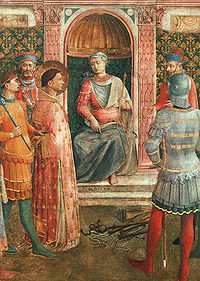St Lawrence
| Saint Lawrence of Rome | |
|---|---|

Lawrence before Valerianus, detail from a fresco by Bl. Fra Angelico, c. 1447-50, Pinacoteca Vaticana
|
|
| Martyr | |
| Born | 26 December AD 225 Valencia or less likely Osca, Hispania (modern-day Spain) |
| Died | 10 August AD 258 Rome |
| Venerated in |
Roman Catholic Church Eastern Orthodoxy Anglican Communion Lutheranism |
| Canonized | Pre-Congregation |
| Major shrine | Basilica di San Lorenzo fuori le Mura in Rome |
| Feast | 10 August |
| Attributes | Usually holding a gridiron and wearing a dalmatic |
| Patronage | Rome, Rotterdam (Netherlands), Huesca (Spain), San Lawrenz, Gozo and Birgu (Malta), Barangay San Lorenzo San Pablo (Philippines), Canada, Sri Lanka, comedians, librarians, students, miners, tanners, chefs, roasters, poor, firefighters |
Saint Lawrence of Rome or Laurence (Latin: Laurentius, lit. "laurelled"; 26 December AD 225 – 10 August 258) was one of the seven deacons of the city of Rome, Italy under Pope St Sixtus II who were martyred in the persecution of the Christians that the Roman Emperor Valerian ordered in 258.
St Lawrence is thought to have been born on 26 December AD 225 in Valencia, or less probably, in Huesca, the town from which his parents came in the region of Aragon that was then part of the Roman province of Hispania Tarraconensis. The martyrs St Orencio (Latin: Orentius) and St Paciencia (Latin: Patientia) are traditionally held to have been his parents.
He encountered the future Pope St Sixtus II, who was of Greek origin and one of the most famous and highly esteemed teachers, in Caesaraugusta (today Zaragoza). Eventually, both left Spain for Rome. When Sixtus became the Pope in 257, he ordained St Lawrence as a deacon, and though Lawrence was still young appointed him first among the seven deacons who served in the patriarchal church. He is therefore called "archdeacon of Rome", a position of great trust that included the care of the treasury and riches of the Church and the distribution of alms to the indigent.
St Cyprian, Bishop of Carthage, notes that Roman authorities had established a norm according to which all Christians who had been denounced must be executed and their goods confiscated by the Imperial treasury. At the beginning of August 258, the Emperor Valerian issued an edict that all bishops, priests, and deacons should immediately be put to death. Pope St Sixtus II was captured on 6 August 258, at the cemetery of St Callixtus while celebrating the liturgy and executed forthwith.
...
Wikipedia
